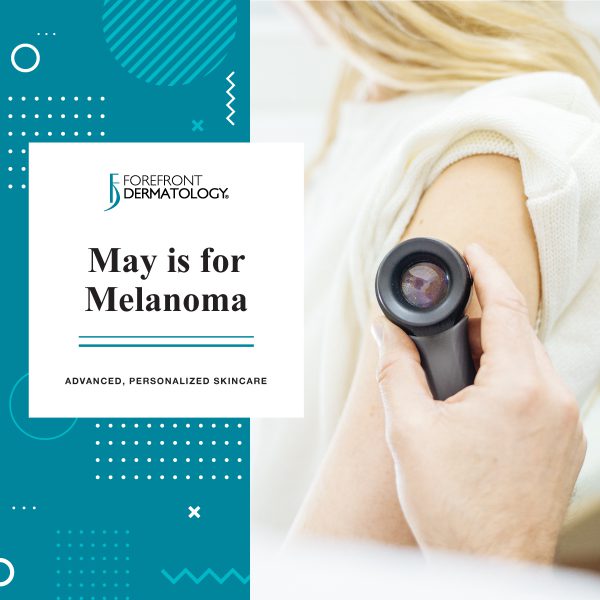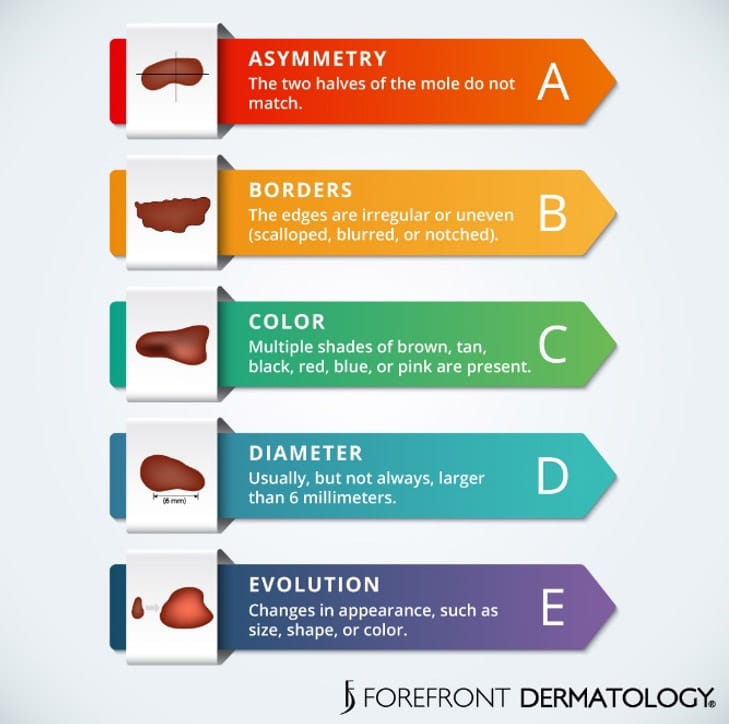
Did you know that one in five Americans will develop skin cancer in their lifetime? Over the past three decades, more people have had skin cancer than all other cancers combined. May is Melanoma Awareness Month and summer is right around the corner – it is a great time to become more informed about skin cancer.
There are two categories of skin cancer, melanoma, and non-melanoma. Melanoma is a dangerous form of skin cancer that, if not detected and treated immediately, can spread to other areas in the body. Early diagnosis can be the difference between life and death. According to American Cancer Society research, if melanoma is caught in stage one, the 5-year survival rate is 97%. Late detection survival rates can be as low as 15%.
Know the Signs
Skin cancer does not discriminate by age, gender or ethnicity. It is important to know the signs of skin cancer and perform a monthly self-skin check to spot potential malignancies early. While skin cancer can occur anywhere on your body, approximately 85% of cases are located on the head and neck, the most sun-exposed area of your body year-round.

Dermatologists commonly refer to the ABCDE’s when examining your skin. The diagram on the right is an excellent tool to help guide you through a skin check, putting this acronym into practice. While examining your skin, look for any spots that show Asymmetry, have an irregular Border, vary in Color and have a Diameter that is wider than a pencil eraser. It is also important to monitor skin lesions over time to determine if they have Evolved or changed.
Melanoma can occur in a variety of colors including brown, black, red, blue, or purple. These spots can be flat or raised and can bleed easily. Non-melanoma skin cancer, also known as basal and squamous cell carcinoma, typically appears as small, pearly, or pale bumps or as dark red patches that can be raised, flat or scaly in texture. It is extremely important to see your local dermatologist and have any worrisome areas professionally examined. Remember, early detection saves lives and a simple office appointment with your Dermatologist can truly mean the difference between life and death.
Preventative Steps
While there is no foolproof way to prevent skin cancer, there are three key preventative steps. First, try to minimize sun exposure when the sun’s UV rays are at their strongest, typically 10am to 4pm. If possible, while outside seek shady areas and make it a priority to wear SPF30 or higher sunscreen, SPF lip balm and cover your head with a hat. Reapply sunscreen every two hours, or after water exposure.
Second, tanning bed avoidance is crucial in reducing skin cancer risk. Research has shown that yearly more than 400,000 cases of skin cancer in the United States are linked to the use of indoor tanning beds. Tanners under the age of 35 increase their risk of melanoma by 75 percent. The temporary tan is simply not worth the risk.
Lastly, it is important to have an annual skin screening by a board-certified Dermatologist. Skin checks are easy and quick. The doctor will examine each part of your skin and may use a special magnifying glass with a light—called a dermatoscope—to examine certain suspicious spots. If a suspicious lesion is identified, you may need a biopsy, which is a quick, simple procedure. A local anesthetic is applied and a small tissue sample is taken from the suspicious area and sent for evaluation. The purpose is to diagnose the condition, not treat it. If the biopsy reveals skin cancer, the remainder of the growth will be removed at a later date.
At a time of the year where many long for sunny weather and the tan that can come with the sun, take a moment to remember your skin and your future. Are a few months of bronzed skin worth the potential diagnosis of skin cancer later on? It’s your life…what will you choose?
Be Proactive
Remember, early detection saves lives and a simple, yearly in-office skin screening with your local board-certified Forefront Dermatologist can truly mean the difference between life and death. Contact us today to schedule your annual skin screening.





